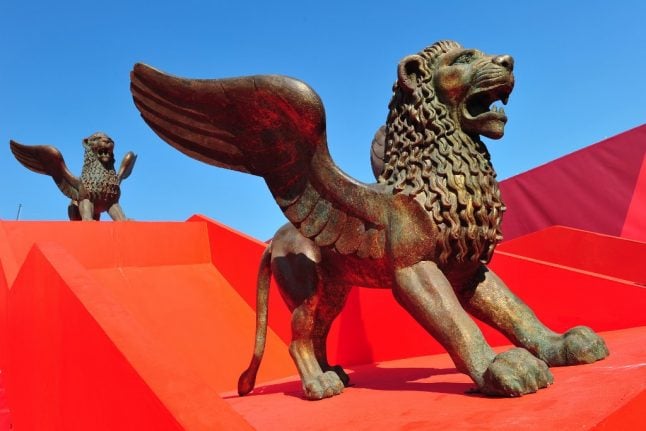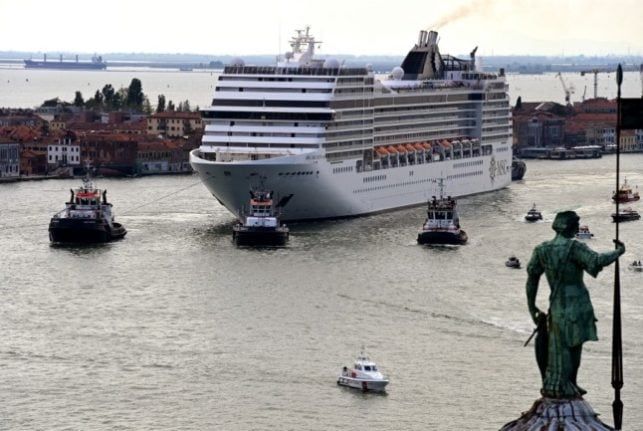FILM
Venice Film Festival fights for impact amid coronavirus curbs and cancellations
What if you threw a film festival and nobody came?
Published: 30 August 2020 12:07 CEST
Updated: 31 August 2020 09:07 CEST
Updated: 31 August 2020 09:07 CEST

File photo: Alberto Pizzoli/AFP
That, in essence, is the challenge facing organisers of this year's Venice Film Festival, the glamorous annual competition where stars, critics, photographers and industry executives mingle on the bustling Lido, overlooking sandy beaches and the blue Adriatic.
Provided, of course, it's a normal year.
But in 2020, the world's oldest film festival is forced to walk a tightrope between preserving its lustre as the premier launch pad for Academy Award-winning films, while safely navigating the coronavirus crisis and averting the controversy over gender inequality that has dogged it in the past.
Opening Wednesday and continuing until September 12, the prestigious event now in its 77th year will be the first international film festival since the pandemic shuttered competitions around the world.
It has put in place a host of safety measures — from limited seating to thermal scanners, to a fan-free red carpet — to protect attendees as Covid-19 cases continue to climb in Italy and around the world.
In July, festival director Alberto Barbera declared the event “saved” as he announced the 18 films among the approximately 60 presented that would vie for the top award, the Golden Lion.
He promised that the festival would preserve the “liveliness of contemporary cinema”.
Despite its scaled-down size with theatre capacity reduced by about half, La Biennale di Venezia takes on greater importance this year due to the cancellation of rival film festivals across the globe, among them the glitzy Cannes Film Festival on the Cote d'Azur in France.
But just days ahead of the opening, organisers are scrambling to navigate uncharted territory amid uncertain attendance and last-minute cancellations.
Whereas Brad Pitt, Meryl Streep and Scarlett Johansson provided the star firepower at last year's festival, ongoing travel restrictions — especially a travel ban from the United States into Europe — mean that most Hollywood elites will be no shows, along with actors and directors from China, India and South America.
Those arriving from outside Europe's Schengen zone will have to submit results of a Covid-19 test just before their departure, with a second test carried out in Venice, meaning that some attendees may have to cancel.
Earlier this week, the festival announced that American actor Matt Dillon would be a last-minute substitute on the jury for Romanian director Crisit Puiu.
No reason was given for Puiu's absence, but industry trade magazines noted he had given a speech earlier this month in which he said it was “inhumane” to watch movies with a mask on.
Those confirmed as attending include, among others, British actress Tilda Swinton, Spanish director Pedro Almodovar, US director Oliver Stone and Danish actor Mads Mikkelsen.
More women directors
The uncertain lineup of stars and dearth of top names leaves Australian actress Cate Blanchett, president of the jury, to take up the mantle of celebrity — and social activism — at Venice.
Blanchett was the leader of the #MeToo women's march up the red carpet steps at Cannes two years ago that sought to bring attention to the lack of parity and diversity in cinema.
The presence of Blanchett helps raise such awareness while the festival seeks to stanch criticism levelled in recent years over the glaring lack of women directors in festivals' top lineups.
MORE CULTURE:
The Oscar-winning headliner told Variety magazine on Thursday that this year's eight women directors in the main competition lineup of Venice is “a direct response to the positive advances that have been made this year”.
Others say it is too early to tell whether a page has turned.
“It's all about being consistent and diligent and believing that women make movies as well as men, and using that in the way you programme,” said Melissa Silverstein, founder and publisher of “Women and Hollywood”, which advocates for gender diversity and inclusion in film.
Last year's festival opened under controversy after the inclusion in the lineup of French-Polish director Roman Polanski, who fled the United States after his 1977 conviction of rape of a 13-year-old girl.
There were also only two female directors in the selection. In both 2018 and 2017, only one female director was represented.
Blanchett said more was riding on the jury's decisions this year, given the limited opportunities for filmmakers to show their work publicly, due to the coronavirus closures.
“So, whatever the deliberations the jury will make will be more impactful. I don't take that responsibility or privilege lightly.”
Url copied to clipboard!


 Please whitelist us to continue reading.
Please whitelist us to continue reading.
Member comments